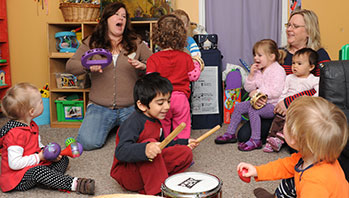- feel
- happy
MA Standards:
Literature: RL.PK.MA.8.a: Respond with movement or clapping to a regular beat in poetry or song.
Head Start Outcomes:
Social/Emotional Development/
Self-Regulation: Recognizes and labels emotions.
Social/Emotional Development/
Self-Regulation: Follows simple rules, routines, and directions.
Language Development/Receptive Language: Attends to language during conversations, songs,
stories, or other learning experiences.
PreK Learning Guidelines:
English Language Arts 12: Listen to, recite, sing, and dramatize a variety of age-appropriate literature.
Health Education 16: Recognize and describe or represent emotions such as happiness, surprise, anger, fear, sadness.
Sing Together: “If You’re Happy and You Know It”

© Commonwealth of Massachusetts, Department of Early Education and Care (Jennifer Waddell photographer). All rights reserved.
Tell children you are going to sing a song about feeling happy.
- Before singing, ask, How will you feel when you see your <mother> this afternoon? Show me how your face will look when you see her.
- Sing the first verse of “If You’re Happy and You Know It” with enthusiasm. Then sing slowly and do the motions as you sing.
- Invite children to sing with you as you do the motions. When children have learned the first verse, add the second and third verses.
If You’re Happy and You Know It
If you’re happy and you know it, clap your hands. (clap twice)
If you’re happy and you know it, clap your hands. (clap twice)
If you’re happy and you know it, then your face will surely show it. (point to face)
If you’re happy and you know it, clap your hands. (clap twice)
Verse 2: If you’re happy and you know it, stomp your feet. (stomp feet twice)
Verse 3: If you’re happy and you know it, shout hurray! (shout hurray)
Verse 4: If you’re happy and you know it, do all three. (clap hands, stomp feet, shout hurray)
(Attributed to Alfred B. Smith)
Adaptation: If one or more children do not have or do not live with their mothers, change the wording of your questions throughout to include children’s primary caretakers. For example, say, How do you feel when you say goodbye to your mother or grandmother in the morning?
